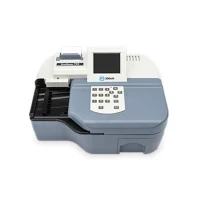
Abbott Urometer 720 Machine
The Abbott Urometer 720 is a medical device used for measuring urinary output. It's commonly employed in clinical settings, such as hospitals and emergency care units, to monitor patients' urine output accurately. Accurate urine measurement is crucial for assessing kidney function, fluid balance, and overall patient health.
Key Features:
1. Real-Time Monitoring:
- Continuous Measurement: Provides real-time measurements of urinary output, which is critical for patient management and timely medical interventions.
- Digital Display: Typically includes a digital display for easy reading of urine output data.
2. Accuracy and Precision:
- High Precision: Designed to provide accurate and reliable measurements of urine volume.
- Calibration: Often includes features for calibration to ensure the accuracy of measurements over time.
3. Ease of Use:
- User-Friendly Interface: Designed for ease of operation, allowing healthcare providers to quickly and efficiently obtain measurements.
- Data Recording: Capable of recording and storing urine output data for later analysis and reference.
4. Integration with Catheter Systems:
- Compatibility: Designed to work with standard urinary catheters and collection systems.
- Flexible Connection: Allows for easy connection and disconnection from the catheter system.
5. Alarm and Alert Systems:
- Alerts: These may include alarms or alerts for abnormal urine output levels, such as extremely high or low volumes, which can be crucial for patient monitoring.
6. Durability and Hygiene:
- Built for Repeated Use: Constructed to withstand frequent use in clinical environments.
- Easy to Clean: Designed for easy cleaning and disinfection to maintain hygiene standards.
Applications:
- Critical Care: Used in intensive care units (ICUs) and emergency settings to monitor patients' urine output continuously.
- Post-Surgery Monitoring: Assists in monitoring urine output after surgical procedures, especially those involving the urinary tract or kidneys.
- General Patient Care: Employed in various hospital settings to ensure proper monitoring of fluid balance and kidney function.
Benefits:
- Improved Patient Monitoring: Provides precise and real-time data, helping healthcare providers make informed decisions about patient care.
- Efficient Data Management: Facilitates better data management and record-keeping, which is valuable for patient assessments and treatment planning.
